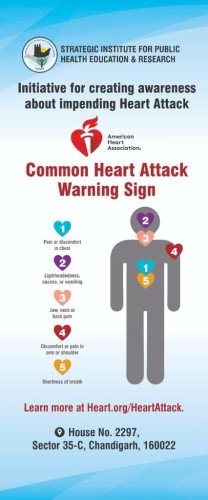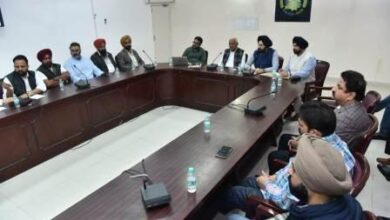Punjab
Heart Attack Prevention: Minimizing Risks and Timely Intervention

Chandigarh, 3 Jan : updatepunjab: Strategic Institute for Medical Education and Research (SIPHER) in collaboration with RCTC, Department of Community Medicine and School of Public Health, PGIMER, Chandigarh is creating awareness to minimize the risk factors of Heart Attack (Myocardial Infarction) and save precious lives by timely intervention.
Prof. Sonu Goel Department of Community Medicine, PGIMER Chandigarh said that, In accordance with the World Health Organization, India accounts for one-fifth of the deaths worldwide due to Non-Communicable Diseases including Cardio-vascular diseases (CVDs), especially in the younger population.
He stated that Non-Communicable diseases like CVDs, Hypertension, Diabetes and Cancer etc account for 60% of deaths. We plan to manage these by controlling abuse of Tobacco, Alcohol, and addicting Drugs. Our Endeavour will be to ensure less use of Salt, sweets and Trans Fats by bakeries and other food manufacturers.
He added that, there are gaps in Infrastructure and Manpower in Government health institutes all over India. He also said that Public Health is important for ensuring prevention of diseases whether Communicable or Noncommunicable.

Dr Rakesh Gupta, President and Director of Public Health elaborated that, Knowledge is power. If you understand the risks for heart attack, you can take steps to improve your health. Risk factors are traits and lifestyle habits that can increase your chance of having a heart attack. So, it’s important to know them. You can change some risk factors, some you can’t. The first step is to talk to your health care professional, which can help you reduce, control or prevent as many risk factors as you can.
Recommend healthy changes to your daily habits
They may recommend healthy changes to your daily habits, prescribe medication, or both. If you don’t have a primary care physician, you may be able to see someone at a clinic in your community.
He further added that, If you’re between 40 and 75 years old and have never had a heart attack, ask to have your risk of a cardiovascular event assessed in the next 10 years. Traditional risk factors for heart attack include: Diabetes High blood pressure, Overweight or obesity and Lipid imbalance or High cholesterol with an acronym “DHOL”. The answer to the problem is simple, Behavioral Change, Happiness, Active Lifestyle, Nutrition, Glucose control, Risk management and Abstinence from Tobacco & alcohol with acronym of “BHANGRA”
Dr Rana J Singh Director, South East Asia, Vital Strategies said that, Risk-enhancing factors including Family history of early atherosclerotic cardiovascular disease (men less than 55 years old, women less than 65 years old),High cholesterol (LDL-C 160-189 mg/dL; non-HDL-C 190-219 mg/dL),Metabolic syndrome, Chronic kidney disease, Chronic inflammatory conditions (e.g., rheumatoid arthritis, psoriasis, HIV/AIDS),History of preeclampsia or early menopause, ancestry) and Higher than normal triglycerides (175 mg/dL or higher) need to be managed in consultation with your physician.
Dr S.S. Sibia, an accomplished physician of the region, said that the common warning symptoms of an impending heart attack are Pain/discomfort in chest, nausea/vomiting, Jaw/neck/back pain, Discomfort/pain in arm or shoulder, shortness of breath and excessive sweating.
He added that in case of a suspected impending heart attack, before the patient can be taken to the hospital, he/she may take a loading dose of a combination of Aspirin, Clopidogrel, Atorvastatin and Sorbitrate (only if BP is normal or High) with dosage as suggested his/her physician to save many lives.




